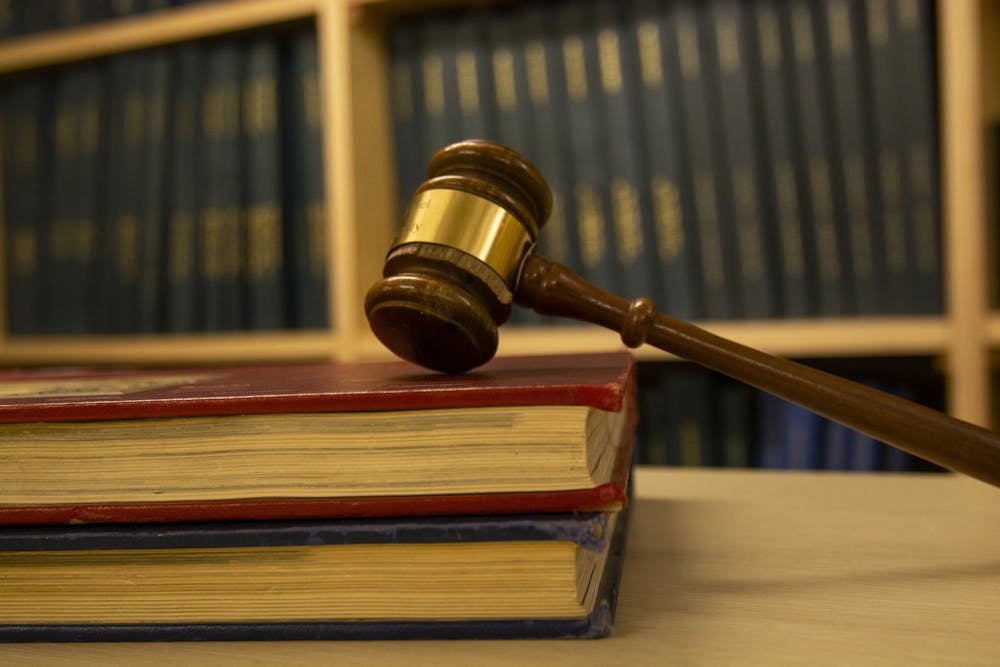New and ongoing cases of alleged Honor violations will not move beyond the accusation stage of the trial process while students are away from Grounds, according to Lillie Lyon, Honor Committee chair and fourth-year College student. The University also plans to confer degrees to graduating students who are involved in ongoing Honor cases.
“All investigations are going to be moved online through a panel … if someone is accused, we’ll then pause the case there, because we just don't see a way to fairly hold hearings online at this point in time,” Lyon said during the Committee’s weekly meeting March 29. “And so we're going to suspend case processing post-accusation.”
Lyon worries that online hearings could lead to claims of unfairness due to potential technical errors. It would also be logistically difficult to hold hearings online, she added.
“The average Hearing involves 20+ participants and requires very specific timing for different participants' entrances, exits, and participation,” Lyon explained. “An online format is not well-suited to ensuring that all of these needs are met sufficiently and appropriately.”
Honor will still be taking new cases, however no case will move beyond the Investigation Panel stage, where three Honor Committee members decide whether a case meets the standards to go to trial.
Previously, when a student was going to graduate while being tried for an Honor offense, their degree would be held until the case was completed and they would not graduate if they were found guilty. Given the unprecedented circumstances that exist due to COVID-19 and the University’s operational changes, however, Honor will not hold degrees, and these students will be able to graduate.
“Given the current circumstances, we'll see if we end up with any fourth-years who are accused prior to when they would normally graduate — in which case under normal circumstances we would then hold their degree — but under the current circumstances we intend to confer those degrees,” Lyon said. “And then, if the student is later found guilty in a hearing, we’d revoke the degree.”
Lyon also announced that Honor will donate approximately $2,000 to Student Council’s Hoos Helping Hoos mutual aid network — which hopes to connect first-generation, low-income, international and working students with resources they may need in the midst of uncertainty due to COVID-19. According to their latest Facebook update March 26, Hoos Helping Hoos has raised over $14,000.
“[Honor] will be donating the remainder of the budget for our committee to the Student Council to distribute through their mutual aid program, and the food pantry program and anything else that they're running right now,” Lyon said.
During past Honor meetings, the Committee had discussed modifying their definition of lying, which is one of three acts that could lead to a student being accused of an Honor violation, including cheating and stealing.
Lying is presently defined as “the misrepresentation of one or more facts in order to gain a benefit or harm another person, where the actor knows or should know that the misrepresentation will be relied upon by another person,” according to the Honor bylaws.
Honor is working to redefine lying to work out “social lies,” which Lyon described broadly as “lies that don't relate to a student's academic or professional prospects.”
However, due to the outbreak of COVID-19, the Committee has decided that changing the definition would confuse students who have to worry about adjusting to virtual classes, potentially moving back home and staying healthy.
“To make such a substantial change at a point in time where people are for good reason preoccupied with other things [...] it would be a bad idea to pass something like this now,” Lyon said.
Law student Todd Truesdale, who initiated the effort to change the definition of lying, thinks that COVID-19 shouldn’t necessarily stop this change.
“I think we're still doing our constituents justice through these [weekly Committee] Zoom meetings, and I don't think it would be a particularly bad change, but in the same breath, I understand the concerns about changing something,” Truesdale said.
Truesdale noted that he will be returning to the Honor Committee next semester and will continue pushing to change the definition then.
Furthermore, Lyon announced in an email that Honor will also be postponing the election of new Executive Committee members until the weekend of April 3. Originally, the terms for the newly elected Committee was intended to begin April 5. That full transition will instead occur some time in mid- to late-April.







